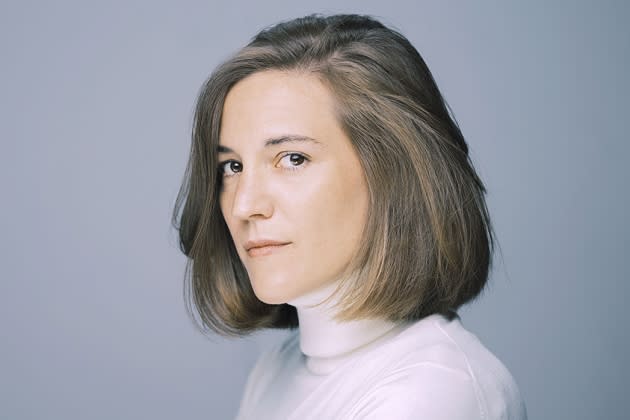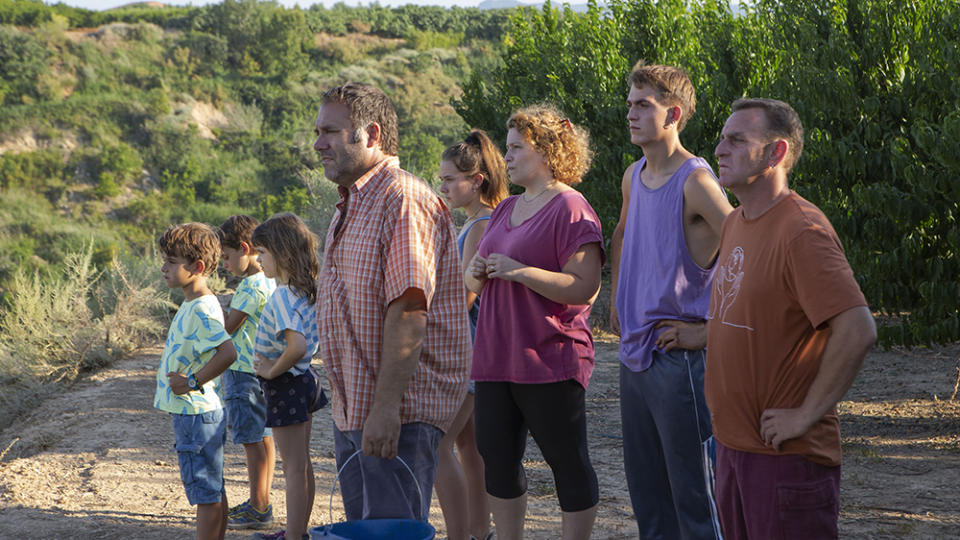‘Alcarràs’ Director Carla Simón On Harvesting Peaches, Learning From Each Film
- Oops!Something went wrong.Please try again later.

Carla Simón’s first feature “Summer 1993” was a knockout; a Generation Kplus and Best First Feature award winner at the 2017 Berlinale and Spain’s 2018 Oscars submission, winning three Spanish Academy Goya Awards. The director has since become a reference within a new wave of Catalan women filmmakers that have broken out to considerable box office and festival success.
Now, Simón competes in Berlin’s main competition with her sophomore effort “Alcarràs,” exploring her own roots through her adoptive mother’s family.
More from Variety
Berlinale Title 'Concerned Citizen' Sells to Several Additional Territories (EXCLUSIVE)
MUBI Buys Berlin Golden Bear Winner 'Alcarras,' U.S. Theatrical Release Set for 2022 (EXCLUSIVE)
Set in the so-called Catalan Far West, in a small village near Lleida, the film is shot entirely using non-professional actors. “Alcarràs” tells the story of a family who make their living harvesting peaches and are forced to abandon the lands they have been taking care of for sixty years under a perpetual verbal agreement with the landowner. After the landowner’s death, his heirs no longer recognize the agreement and want to change the situation.
“Alcarràs” is sold by MK2 and produced by Elástica Films, Avalon, Vilaüt Films and Kino Produzioni.
How is “Alcarràs” a follow-up of “Summer 1993,” and a step forward in your career?
The continuity is in the tone, in looking for a special realism in the actors, in this case non-actors, with the aim to keep them all “alive.” However, “Alcarràs” needed much more structure, especially for the work on the point of view. Whereas in “Summer 1993” we just followed the protagonist continuously, here we have twelve separate characters. As far as camera planning, “Alcarràs” required a very different effort.
Beyond the tone and structure, can you talk about the visual proposal of the film’s rural environment?
For me, the camera must tell the story for the characters; love them, caress them without the viewer perceiving other stylistic details. In the end, the visual proposal has its own poetry, but it’s deeply rooted in the land, which is what the film is about. Where do I put the camera? For me it should go where the character and their emotions dictate. This has been my philosophy, although I realize that I like long shots, because it keeps the feeling of being with the characters.
In times of gentrification, you tackle a family’s attachment to the land…
Agriculture is the theme of the film and was a key reason for me to make the film. My uncles grow peaches in Alcarràs and, like them, there are many other people who are really screwed, because it is very difficult to engage in family farming at present. I would certainly like to raise awareness about this. The severe changes that are being suffered and why this type of agriculture is not protected. Ultimately, it is this form of agriculture that is most respectful to the earth.
In a rural environment and being a film with so many characters, the work with sound must have been another decisive element…
When you’re working with many people, a lot of things happen at once and the cinema becomes two-dimensional. You can play with perspective, but what really gives you the feeling that there’s a lot going on at the same time is the sound, and we worked on this thoroughly.
“Summer 1993” was remarkable for the performances of its non-pro actors. Did you change your directing methods in “Alcarràs”?
It was a similar process but much longer. We did casting for a year before the pandemic, looking for the actors. We went to all the popular celebrations in villages to look for candidates with resemblances to our characters. Then I moved to Lleida and worked with them individually or in pairs, mainly working on feelings or emotions raised by history. Once they had assimilated the feelings of the characters we began to rehearse, with a reading of the script only, giving some room for improvisation— normally I do not want them to memorize much. We had the wonderful casting director – Mireia Juárez, street casting teams and coach, Clara Manyós.
“Alcarràs” is part of a trilogy that will culminate with “Romería.” Where is your career going now?
The idea is to start financing “Romería” soon. It has been on hold because the production of “Alcarràs” was very complex. Beyond this I have ideas, but nothing concrete. I want to continue with my realistic approach but break with it to some degree to explore other things. I think it’s important to say of every movie: “I don’t know how to do it; I have to learn how to do it.”

Credit: Avalon, Elastica, Vilaut
Best of Variety
Sign up for Variety’s Newsletter. For the latest news, follow us on Facebook, Twitter, and Instagram.

